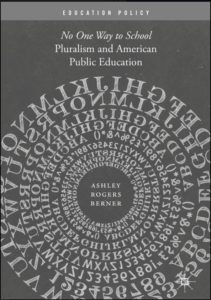 When it comes to public education, the U.S. stands apart from many industrialized democracies. It excludes private and faith-based schools, and has generally relied on local governments as the sole providers of publicly supported education in a geographic area.
When it comes to public education, the U.S. stands apart from many industrialized democracies. It excludes private and faith-based schools, and has generally relied on local governments as the sole providers of publicly supported education in a geographic area.
A new volume by Johns Hopkins University researcher Ashley Berner argues this arrangement is largely an accident of history. She points to a new definition of public education, which is publicly funded and publicly accountable — and encompasses private schools.
As she writes in her final chapter:
No One Way to School attempts to draw a more inclusive argument that rests upon the foundational goals of the common school, while affirming that they are better met by plural education, than by uniformity. Excellence, equity, opportunity, and citizenship resonate across America’s educational history.
She contemplates a three-sector approach to public education that fits alongside The Urban School System of the Future, the policy platform of the Black Alliance for Educational Options, and precious few others in today’s education debate.
Her ideas echo many of the themes we’ve tried to emphasize for more than six years on this blog. And they’re likely to stretch the thinking of people in just about every corner of the school choice movement.
She draws vital lessons from John Chubb and Terry Moe about the ways bureaucracy can vitiate academic excellence, but she abjures the hands-off regulatory approach they advocate as one of several “narratives that risk being counter-productive.”
A growing number of scholars and practitioners – in cities New Orleans and Denver and at research institutions like the Center on Reinventing Public Education – have embraced a vision of educational pluralism, in which districts manage portfolios of schools run by multiple providers. But Berner raises questions for them, too: Why shouldn’t these portfolios include faith-based private schools?
Refreshingly, she draws insights from around the globe, ranigng from familiar educational paragons like Finland and under-publicized Northern European success stories like the Netherlands to more obscure jurisdictions like Hyderabad, India and Alberta, Canada.
In these places, she finds cause for optimism that reformers can demand rich curricula, promote transparency and include a diverse range of public and private schools in a redefined public education system. She attempts to strike a difficult balance that would hold all schools to high standards of academic excellence while avoiding overly prescriptive measures that seem to have triggered a backlash against test-based school accountability policies in this country.
Along with domain knowledge and commensurate tests, a district or state could require all funded schools to make their curriculum and student outcomes public. Each school could publish its course of study including the textbooks used, the proficiency targets, and students’ academic outcomes. At the same time, schools could embrace a broader understanding of “outcomes” and report upon those that fit its ethos. Montessori schools might want to talk about the development of democratic character, which has a very specific meaning in the Montessori culture (“valorization”). Evangelical Protestant schools might elevate “Christian discipleship” above all other goals, including academic achievement; this, too, could be articulated in a way that mattered to parents. Schools in Northern Europe publish indicators of how their graduates fare in the workplace, and some American districts would have an interest in such information, as would businesses in funding data dashboards.
She worries her vision could face opposition from two quarters. Freedom-first libertarian types might resist attempts to hold all schools to comparable academic standards, fearing this would force them to compromise their unique character. Teachers unions and their allies may resist a definition of pluralism that includes schools that aren’t subject to collective bargaining agreements.
Berner’s writing offers hope these groups could embrace a pluralistic system, and their principles would make it better, by resisting bureaucratic encroachment and ensuring it meets the needs of educators.
Even if it navigates their objections, a pluralistic system would face other barriers.
States would have to start funding schools based on the number of students who attend, with dollar weighted based on students’ characteristics. Some state constitutions may need to be modified to make way for education systems that aren’t confined to uniform public schools, though Berner notes courts have been more willing to accommodate public funding of religious education than many people assume. A breed of institution – a state agency or school district that “functions like its counterparts in the Netherlands or Alberta” – would have to emerge to govern a pluralistic education system.
Berner’s reading of history brings more good news. The new definition of public education echoes the original one. At the time of our country’s founding, education was “organized and funded at the local level,” and in some towns, religious sects, especially Jews and Catholics, operated their own school systems.
But then, leading up to the early 20th century, antipathy toward an influx of European immigrants inflamed anti-Catholic bigotry. Sectarian schools were stripped of public funding and gave way to Protestant hegemony. “Common schools, which promoted assimilation and stressed uniformity, became the dominant educational model,” Berner writes.
For those who believe a pluralistic education system of the future can, and must, better achieve the ideal that drove the creation of its uniform predecessor — providing a meaningful education to every child — No One Way to School provides a useful guide.



[…] A new volume by Johns Hopkins University researcher Ashley Berner argues this arrangement is largely an accident of history. She points to a new definition of public education, which is publicly funded and publicly accountable — and encompasses private schools. Read More. […]